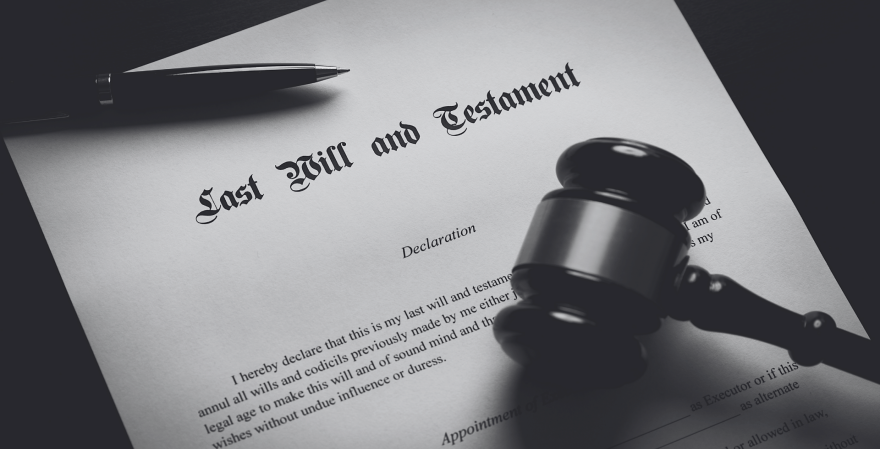Understanding the various parts of a Will

A Will is a document that will protector take care of the interest of your loved ones.
In pure and simple terms, making a Will not only ensures that your wishes are respected once you are gone, but without a carefully prepared Will, all your investments and inheritance planning that you had carefully charted out could simply fall apart. No one knows when the day would arrive when we need to leave everything behind and depart. But our loved ones will remain. Hence, it is our duty, if we so desire, to ensure that our beloved ones are not compelled to run around from pillar to post and spend their scarce resources just to get what you had toiled all your life for and desired that they get it smoothly.
Therefore, the law of the land facilitates an easy process to ensure that the intended desire of a person is easily transmitted: through a Will prepared and executed by the person who has made it with complete freedom and knowledge.
A person who executes a Will is called as a TESTATOR and those who are named to receive distribution of his assets are generally referred to as Legatees or Beneficiaries.
A person who dies without executing a Will is referred to as a person who has died
Intestate.
There are a few requirements or parts a Will should generally have:
1. Title/Heading
2. Debts and Taxes.
3. Distribution/Disposition of Assets.
4. Guardianship.
5. Executor and Trustee and their Powers
6. General provisions
7. Testator being in good health and of sound mental state
8. Signing and Witnessing the Will
9. Will Storage
10. Codicils
Before discussing the above salient requirements may we state here that there is no requirement to have the Will drafted by a legal professional/ lawyer. There is NO NEED to have it typed or prepared using a computerised facility: it can be handwritten as well. However, it is preferred and advisable to have it type written as very often the handwriting of the person preparing the Will document may not render itself legible for a uniform reading and understanding. It may lead or give rise to confusion or other complexities. Hence, we advise that it is type written.
Again, it is NOT required under law for the Will document to be in the English language. It could be in any acceptable vernacular language that is officially recognised and accepted by any state government. Once again, however, the English language is preferred as this language renders itself to be clearly explained and understood uniformly.
It is very important that in whichever language the Will document is prepared, the contents shall be absolutely clear and unambiguous. It should not be left to the different readers to understand it in different ways. It should mean the same to each and every one who peruses it so that all actions by every official or authority acting on a Will document will be uniform.
Finally, the law does not require the Will to be written or typed on a stamped paper. It only needs to be written on a plain paper and further it need not be Notarised.
Further, Registration of a will is not mandatory in law even if it comprises of immovable property. However, in case you want to register it, you may do so with the applicable registrar or sub-registrar of assurances (where you reside). While the registration is not mandatory, under Section 18 of the Registration Act, 1908, the registration of Will is advisable, as a registered WILL cannot be tampered with, mutilated, destroyed or stolen. It is generally considered as a genuine WILL. A unregistered Will is not at al invalid in law. Normally a document must be registered within 4 months of its execution as per the Registration Act, 1908; but, Section 23 read with Section 27 of the Indian Registration Act carves out special exemption to WILLs, and allows registration of WILL subsequent to its execution, and without any time limit.
Let us discuss in brief each of the requirements above:
1. The title put forth in a Will is the very first part of the simple will, written at the top of the very first page. The title declares or identifies the document as a Will as distinct from other documents and it says whose Will / testamentary document it is.
Generally, this title is in a different font and is in bold text and centered though it is not a legal requirement. Such a text stands visually apart from the rest of the Will. When a title is in this format, it is expected to add or afford a sense of seriousness to the document.
It should be ensured that throughout the Will document (including in its title), it is important to use your full legal name as it is in your legal or identity documents like your birth certificate, marriage certificate, Aadhar card, PAN card, Passport etc. Additionally, you should mention your Identity details like “Son of/ Wife of/ daughter of”, age and date of Birth, full residential address (permanent as well as the current address if any) etc. Using your full legal name makes it less likely that your Will could be confused with documents made by others who have similar names or those who share parts of your name.
Where you had opted to change your name (may be for clarity’s sake in the past) or a court order changing your name, whichever is most recent, please ensure to state these facts and attach a copy of the related gazette certificate/court order/newspaper publication as well along with the Will document.
Please do not use initials that form a part of your name. Just complete your name in full by expanding the initials for clarity’s sake. Use of the middle initial instead of the middle name can lead to confusion, so we suggest that you include your full middle name (and also all your other names, if any) in the title of your Will, not just your middle or last name initials. If your legal name includes multiple middle names or multiple last names, you should include all of them.
Please ensure that you do not use a/any nickname(s) or some shortened version of your full legal name, even if you prefer people to call you by a name other than your full legal name. At the most you may state that you are referred to as “…” as a nick name. This would lend clarity to your identification, just in case you had also used your Nick name in any of your documents while acquiring certain assets.
Your full legal name is your name as it appears on your birth certificate or, if you have legally changed your name, through a marriage certificate or a court proceeding, it is your name as it appears on the marriage certificate or on the court order changing your name, whichever is most recent.
It is here that it becomes necessary to have a probate to prove the existence and validity of a Will.
It is well-known that proving the authenticity of a Will is a recurring topic for decision in courts, and there are a large number of judicial pronouncements on the subject. So, one of the ways to avoid the hustle-bustle or overwhelming situation of proving the last wishes of the deceased in the never-ending court proceedings is to obtain the probate from the appropriate court.
In the opening paragraph of your Will, it is preferable for you to state your marital
status (married/ divorced/ widow/ widower) the name of your spouse and the names
of your children (natural or adopted etc) with their brief details, again for clarity’s
sake, though however, this is not a legal requirement.
2. Debts and taxes:
You should have a separate paragraph detailing your debts, the name of the persons or institutions from whom you have borrowed and details of such borrowing. This is important as your beneficiaries will need to be aware that your indebtedness will have to be appropriated out of your assets before they are passed on to your legal heirs/ legatees/ beneficiaries. Important to note that the legatees are not legally bound to meet your indebtedness from their own assets but purely from the assets that you leave behind and this what the Executor of your will needs to take care of before disbursing your assets as per your Will; similar is the case with your statutory tax dues.
3. Distribution of your Assets (generally referred to as the disposition of
assets)
This is the MEAT and substance of your Will as it deals with what/which assets you desire to pass on to which of your legatees/ beneficiaries. You will need to carefully deal with is matter and CLEARLY state your mind so that there is no ambiguity in your decision and everyone understands it correctly.
4. Executor and Trustee and their Powers
This is a very important part of your Will in which you shall determine and appoint a suitable person to carry out your wishes in the distribution of your assets among the beneficiaries as named by you and in the manner decided by you.
For more details of the nature, role and powers of an Executor, kindly read the separate section dealing with this entity.
5. Guardianship: In the event a Testator has named Beneficiaries who are minors (below the age of 18 years) or are otherwise incapacitated to act on their own, such Testator is expected to appoint a person (Guardian) who will take care of the interest of such Minors or beneficiaries who are otherwise unable to take care of themselves. Such an appointment will facilitate a smooth care of the assets of the Testator till the beneficiaries attain the age of majority or acquire appropriate capability. The Executor will also be empowered to facilitate the smooth hand over of the assets to such a Guardian.
6. General Provisions
Certain provisions are generally added to the texts of the Will relating to the effect of the Will on the happening of certain events like divorce or any of the Legatees/Beneficiaries predeceasing the Testator. These provisions also state the fact that there were certain Wills executed by the Testator in the past and by this new Will all the previous Wills are rendered null and void or stand cancelled and revoked.
7. Testator being in good health and of sound mental state and there being
no undue influence or coercion:
Usually, one of the grounds for anyone contesting a Will is on the basis that the Testator was not of sound mental health or was unwell and was therefore, not in a position to understand the contents of the document which is termed as his Last Will and Testament. Hence, a Will is usually signed by the Testator before a medical practitioner who issues an appropriate certificate to the effect that the signatory was in good health and of sound mind when the Will was signed.
8. Signing and Witnessing the Will
Critical among the many ingredients of a Will, signing or executing the will document (on all the pages) is perhaps arguably the most important.
Again, for a Will to be valid, it must be signed by the Testator in the presence of at least 2 other people, (Section 63 in The Indian Succession Act, 1925), both of whom are not beneficiaries of the Will, or a spouse or civil partner of a beneficiary. They must see you sign the document and then shall in turn sign it in your presence, noting their name, address and certain identity number and preferably their contact number so that in the event of a contest at a later date, they can be called upon to state the details of the execution of the Will by the Testator. Hence, it is important to have some reliable and neutral person(s) as your witness.
9. Will Storage:
This is not a legal requirement, but it is a very crucial aspect of your Will because if your ORIGINAL will document cannot be traced/ retrieved it is as useless as if there was NO WILL.
Hence, before or immediately after the due execution of a Will, you shall have to clearly decide where it will be stored. If you go through a solicitor or your advocate, they will agree to store it or hold it in Trust on your behalf. Your close friend or neighbour may also often be good persons for you to entrust your Will document. You may also keep it in your bank locker.
However, years later, and after you are no more (or have become incapable of recalling its location) how will your legal heirs or legatees ever know where or with whom you had placed or entrusted the said Will document.
Hence, we advise you to utilise the services of certain Will Location Registry organisations like Will & More (in India) or Certainty in the UK or other similar organisations in the US or Singapore which are the very few countries where the Location Registry are made available. They will offer Will location registry options for an additional fee or for perhaps free.
It may be noted that a scanned or photocopy of a Will is not legally valid and they have not evidentiary value. The original Will document has to be produced for any authority to act.
Using these services, your beneficiaries can explore an opportunity to cause a SEARCH to find out if you had mentioned the place where or with whom you had placed the Will. It may even be tucked away in one of your cupboards in between your clothes or papers or even with a good friend but may turn out to be difficult to retrieve.
However, what is important in these Location Registry services is that you should regularly update the location of the Will document each time you decide to change the location.
10. Codicils:
Codicils mean a legal document that acts as a supplement or addition to your last Will and Testament. It is through this document that one that explains, modifies, or revokes a Will or part of the Will that is already executed. In this document, you can state the changes you desire to make in your Will without having to rewrite your entire original Will document.
It is however, advisable to re-draft and execute a new Will document if there
are too many changes / inclusions or exclusions. But be careful not to make any alterations to the original document as alterations will invalidate the Will in toto.





